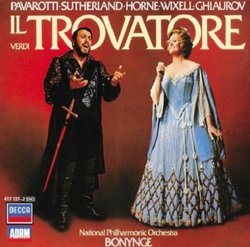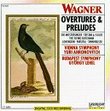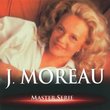| All Artists: Giuseppe Verdi, Richard Bonynge, National Philharmonic Orchestra, Joan Sutherland, Marilyn Horne, Norma Burrowes, Luciano Pavarotti, Graham Clark, Ingvar Wixell, Nicolai Ghiaurov, Wynford Evans Title: Verdi: Il Trovatore Members Wishing: 0 Total Copies: 0 Label: Decca Release Date: 10/25/1990 Genre: Classical Style: Opera & Classical Vocal Number of Discs: 2 SwapaCD Credits: 2 UPC: 028941713728 |
Search - Giuseppe Verdi, Richard Bonynge, National Philharmonic Orchestra :: Verdi: Il Trovatore
 | Giuseppe Verdi, Richard Bonynge, National Philharmonic Orchestra Verdi: Il Trovatore Genre: Classical
|
Larger Image |
CD DetailsSimilar CDs
|
CD ReviewsMiscasting woes Tracy L. Powell | 04/01/2000 (1 out of 5 stars) "While I am admirers of both Pavarotti (to some degree) and Sutherland, I have to say that they are both miscast in this opera. Pavarotti is a wonderful LYRIC tenor - when he ventures into spinto or dramatic repertory, I find him unconvincing. Manrico is a heavy role, and Pavarotti is reduced to yelling at the end of "Di quella pira." Sutherland, of course, has a wonderful coloratura ability, but only two arias of Leonora's really call for any coloratura at all ("Di tale amor" and "D'amor sull'ali rosee"). The rest of the role finds her out of her league in a primarily spinto part. She changes the whole musical structure of the character by changing what she can't do in terms of power into her strengths, like very high notes that are not in Verdi's score. Bonynge is not his usual dramatic self, Horne and Wixell are only adequate, and the only redeeming feature of this recording is the powerful Ferrando of Nicolai Ghiaurov. Turn to Mehta's magnificent recording on RCA if you want to hear a Trovatore worth listening to." The middle of Verdi's three most popular operas in a great r Craig Matteson | Ann Arbor, MI | 10/20/2005 (5 out of 5 stars) ""Il Trovatore" (The Troubadour) is the middle of the three great Verdi operas from the early 1850s (the first is "Rigoletto" and the third is "La Traviata"). It was a sensation when it opened (people waded through ankle deepwater and mud in the flooded streets near the theater the morning the opera was to open to claim their seat for that evening's performance). It soon swept Europe and the world and remains an audience favorite a century and half later. The music has sometimes been criticized for appealing to the cheap emotions of its audiences, but it remains widely performed and greatly loved. There are many great musical moments in the opera, many of them given to Manrico, as you would expect, but there are also fabulous moments for the chorus including the crowd pleasing "Anvil Chorus" (which is really a song from the gypsy camp, not a bunch of blacksmiths or workers of fire from the infernal pits!). The libretto is taken from a famous play of the time by Antonio Gutierrez and reworked for Verdi by Cammarano (completed by Bardare after Cammarano's death). It is a very convoluted plot, but very dramatic and provides any number of dramatic situations for a wide range of music and combinations of forces. Verdi completed the music quickly since he had a clear idea of where he wanted to go with the opera more than a year before the libretto was completed. For Verdi, the role of Azecuna, Manrico's mother, was the central role. He had thought about calling the opera "The Gypsy" or "The Vendetta". The character of Azecuna is an innovation. She is a leading role and sung by a mezzo-soprano. Verdi did more with this vocal register in later operas. He uses characters in this vocal register as a mix of positive and negative qualities and they are usually quite troubled. So, what is this wonderful opera about? As the opera opens we hear a soldier of Count de Luna keep his guards awake with a tale of a gypsy the Count's father had burned at the stake. She cursed the family as she died. The Count's brother was missing afterwards and a baby's bones were found in the ashes. The Count and Manrico (the troubadour of the title and a soldier for the Count's rival) are rivals for Leonora (a lady-in-waiting for the Princess of Aragon). So, they fight not only for Lenora, but on different sides of the struggle for who will rule. It also turns out that Manrico's mother, Azecuna, is the daughter of the gypsy who was burned at the stake and sought by the Count for revenge. There are duels, battles, captures, treachery and attempted rescues aplenty. In the end, Manrico and his mother are in prison. Leonora loves Manrico and promises the Count she will be his if he lets Manrico go. She takes a slow acting poison to cheat the Count of his prize, and goes to Manrico. He will not accept that she has given herself to the Count and is quite cruel to her until the poison begins acting too quickly. The Count sees their love and is incensed. Leonora dies, the count has Manrico beheaded, and the broken Azecuna who tried to warn the Count to not kill Manrico, now tells him that he has killed his own brother. He understands the horror, and Azecuna, sinking to the ground, tells her mother that she is finally avenged. The Count regrets that he must live. This recording with Pavarotti as Manrico, Sutherland as Leonora, Horne as Azecuna, and Ingvar Wexell as the Count, is quite good. The solos and ensembles are quite effective and the choruses are magnificent. The ballet music was left off so it would fit on two compact discs. Rats. Considering the case holds up to four and the cost of a CD is about fifty cents or less and they charge us more than thirty dollars for this work, you would think they could spring for one more CD and give us everything. Anyway, this was recorded in London in 1976 and came out in 1977 and still sounds great." Great Singers in Their Prime. Tracy L. Powell | Bangkok, Thailand | 02/06/2000 (5 out of 5 stars) "Giuseppe Verdi's greatest "numbers' opera is given an exciting performance on this recording. Joan Sutherland is an incredible Leonora. Not only does she easily handle the coloratura, but she also shows off the dramatic side of the role. And her diction is crystal clear. Pavarotti obviously loved the role of Manrico (what tenor wouldn't?) as he passionately sings with his usual ringing tone. Perhaps he should've been singing Faust, Manon (in French and more often), Romeo, and even Werther, and Hoffman instead of Manrico at this time, but we have to live with the choices he made. Marilyn Horne is appropriately scary at times and loving as a mother at other times. And this role gives her the opportunity to show off her beautiful chest voice. At times she almost sounds like a baritone! Although I don't think Ingvar Wixell's turn as Count di Luna is his best work, he is still more than adequate. And I believe he is too often maligned. Nicolai Ghiaurov shows off his thunderous bass as Ferrando."
|

 Track Listings (18) - Disc #1
Track Listings (18) - Disc #1


